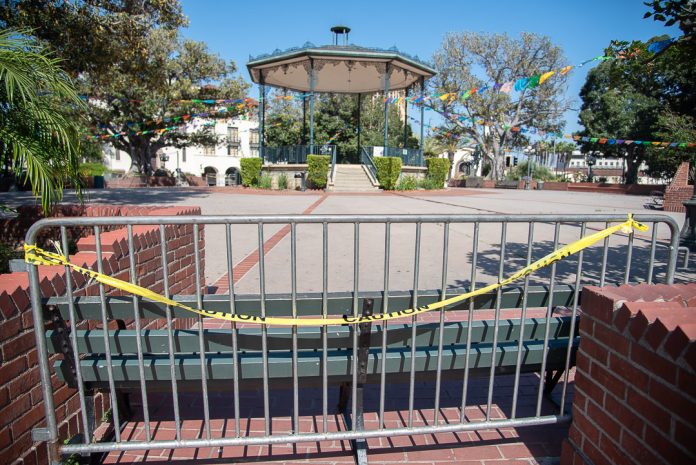Sierra Schumann
Contributing Writer
The introduction of COVID-19 has undoubtedly changed everyone’s lives over the past few years. Living through this event, which will be taught in history classes for years to come, is both terrifying and unique.
While science has made grand improvements and monumental strides in overcoming this earth-shaking virus, it seems that every time we approach “normal” life, a new surge of sickness or a new variant arises, and we are swept back into the tumultuous cycle of mask mandates and online classes. This seemingly never-ending cycle poses a contentious question: will we ever go back to normal life?
Here at UC Santa Barbara (UCSB), students were hopeful, as the fall quarter allowed for the return to in-person instruction. Yet just as school was on its way back to normal, the Omicron variant took over, reintroducing Zoom lectures and asynchronous learning.
COVID-19, despite its unpredictability, has made itself so predictable to the point where the promise of “only two weeks of online classes” is no longer believable. Going online for the full month of January was no surprise to many after the first two-week interval was introduced.
As recent history has proved, and as first-year UCSB undergraduate Annika Hando told The Bottom Line (TBL), “Two weeks is never just two weeks. In 2019, we all were so excited for an extra-long spring break, but those two weeks ended up to be a two-year-and-counting escapade.”
When considering whether we will ever return to normal life again, students hope the answer is yes, but realize that reality disagrees. While we are certainly in a far more advanced and knowledgeable position compared to a year and a half ago, it feels like every time there is a glimpse of hope, something new comes along. It is a never-ending fight, and it is hard to imagine that life will ever be the same as it was before the pandemic.
From the suffering of so many families to drastic changes in mental health, everyone underwent some form of personal change during the months of isolation.
When TBL spoke with Sean Andampour, another freshman at UCSB, he reflected on the pandemic. “It made me feel more sensitive because while being isolated from everyone, there is a certain amount of anxiety that builds up, so I feel like I have become more empathetic and understanding of others,” he said. This illustrates one of the many ways in which COVID-19 has changed people on a level that will remain unaltered, even if life returns to so-called “normal.”
In addition to the personal changes brought on by isolation, there are many logistical areas that have drastically shifted to accommodate social distancing. COVID-19 has shown affluent countries like the United States that we are able to get just about anything done with technology in a much faster, and sometimes simpler way. Time can be used more efficiently as we can multitask Zoom calls and household chores. With this considered, the transition to online schooling and working from home could quite possibly be the new normal.
Furthermore, after seeing how easy and enjoyable it can sometimes be to work or do school from home in one’s pajamas, or order groceries online and forgo the effort of in-person shopping, we got a taste of a new life. For some, they may not be able to or even want to go back to a life where they have to put on a suit and tie and sit in traffic every day.
“The pandemic forced us to become sort of hyper-advanced in using technology for everything. So many things shifted to being online, and I think some of that will stay the same as we move forward,” stated Pavel Tantchev, a first-year undergraduate at UCSB.
While society will most likely, and has already started to, return to many of its old rituals such as the reintroduction of stores, restaurants, parties, concerts, and business as usual, the overall mentality of everyone living through this event will be forever changed.
Pavel captured the sentiments of many students at UCSB when describing how their mindset has changed due to COVID-19. “Since COVID-19, I feel like I am a lot more conscious about germs and overall taking care of my health”, he said. Coming from a world filled with physical touch, large gatherings, and traveling, the new significance of germs has rewired many people’s brains to become hyperaware about the spread of germs and staying healthy and safe. Pavel added, “I think masks will stick around for a while.”
This surge of illnesses brought about by COVID-19 is more widespread than any other in history, and this in itself has the power to change the world’s view of what is “normal.” Changing the way we view disease and intertwining politics with human health in a way we have never seen before, the impact of COVID-19 on the media and polarization of countries like the United States is something that will forever be ingrained in our minds.
Moreover, while this exact moment of online classes, travel bans, and mask-wearing will not always be the new normal, this constant state of change and unpredictability may be.
As said by Sean Andampour, “I think we can try to go back to normal, but it is so hard to say that will happen because I don’t even know what is considered normal anymore. I think eventually we will start to recognize a new normal.”











